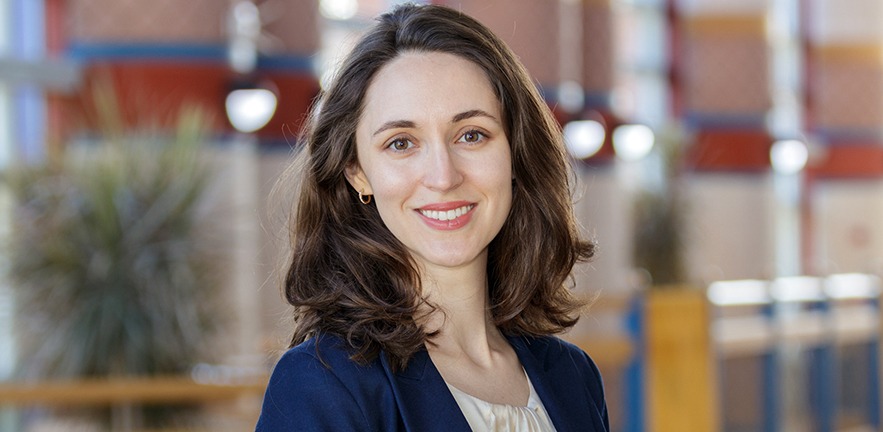A book proposal on pioneering entrepreneurial solutions to climate change by Ariel de Fauconberg, a PhD student at Cambridge Judge Business School, wins the Bracken Bower Prize of the Financial Times for best book proposal by an author under age 35.
A book proposal on pioneering entrepreneurial solutions to climate change written by Ariel de Fauconberg, a PhD student at Cambridge Judge Business School, won the Bracken Bower Prize awarded by the Financial Times for the best business book proposal by an author aged under age 35.
Ariel was named winner of the £15,000 prize at a ceremony at the Victoria & Albert Museum in London on 5 December, announced by FT Editor Roula Khalaf.
Ariel’s book proposal – entitled Before the Dawn: Racing to Net Zero on the Front Lines of Climate Innovation – traces the triumphs and heartbreak of 60 entrepreneurial teams seeking a “fundamental transformation” of business practices and global infrastructure in order to combat climate change.
In the trenches: from the front line of tackling climate change
The book idea stems from Ariel’s observations while embedded for 18 months at a climate tech accelerator in Cambridge doing research for her doctorate.
One of the prize’s judges, Katherine Garrett-Cox, chief executive of GIB Asset Management, described the book proposal as a “standout” account “from the front line of tackling climate change”.
Ariel is a Gates Cambridge Scholar and a PhD student in the Organisational Theory & Information Systems subject group at Cambridge Judge Business School, University of Cambridge. She previously graduated from the Business School’s MPhil Innovation, Strategy & Organisation programme in 2020.
An incredible future if we use tech to combat climate change
Accepting the award, saying it is “impossible to reach these spaces on one’s own”, Ariel thanked Gates Cambridge, Cambridge Judge Business School and its “unparalleled” community of researchers, and several Cambridge Judge faculty.
“I hope all of you leave this room and this event tonight with more of an inspiration towards what we can do on the climate tech front,” she told the ceremony guests. “My entrepreneurs risk so much professionally but they all see this future that we all can hope will actually manifest, maybe by 2050 at the latest but hopefully even sooner.
“So rather than necessarily thinking of the climate angst that can come out of all the news we hear on a routine basis, that’s perfectly valid, but we also have such an incredible future we can shape going ahead.”
Compelling and enjoyable insight into future business trends
The prize is awarded by a jury “looking for a proposal that provided a compelling and enjoyable insight into future trends in business, economics, finance or management”. The prize is supported by the Financial Times and consultancy McKinsey, and named after Brendan Bracken, former chair of the FT, and Marvin Bower, former managing director of McKinsey.
At the same dinner ceremony in London, the Financial Times Business Book of the Year Award was presented to Chris Miller for Chip War, an account of the global battle for semiconductor supremacy.
Ambitious, even crazy, but essential for climate transformation
The FT in late November published excerpts from the three Bracken Bower Prize finalists’ book proposals, including these passages from Ariel’s book proposal about driven and dedicated people in Cambridge and beyond seeking enterprising solutions to the pressing global problem of climate change:
“Ambitious? Yes. Feasible? Potentially. These entrepreneurs were risking stable career paths, pivoting from decades of experience working in industry, or coming fresh from the lab with just an idea and their PhD in hand from the world’s top schools, to throw themselves into imagining and building the foundation of a new world by 2050.
“Over 18 months, I would follow these climate entrepreneurs as they built and dissolved teams, fought with venture capitalists over the sector-wide lack of hardware funding, be hyped in international news outlets, reject millions of dollars of needed venture seed funding based on personal value conflicts, and in some cases, secure contracts with members of the Fortune 100 — the biggest companies in the world — that would bolster their growth like rocket fuel.
“These entrepreneurs were pushing to normalise regenerative agriculture in Latin America; to standardise business-to-business (B2B) software-as-a-service (SaaS) carbon emissions tracking practices; to build smaller and more efficient silicon batteries to accelerate a widespread transportation transition to all-electric vehicles; to train advanced artificial intelligence to more quickly identify the new materials needed to make future cargo transportation environmentally sustainable. And these were only four of the teams.
“This wasn’t selling search engine optimisation. Their ambition was a fundamental transformation of global business practices and societal infrastructure. Losing one of our group heightened how aware we all were of the stakes ahead. Yet, I wasn’t there as an entrepreneur: I was embedded as a researcher for my PhD at the University of Cambridge, studying the challenges and opportunities these 60 founders faced.
“These founders were fighting their way to build effective teams that would scale the innovations needed to navigate the climate crisis and bring society to net zero emissions, taking the challenges of entrepreneurship and making it that extra step harder by pursuing environmental change and financial success without sacrificing either. They all had crazy ideas – mad, ambitious visions of how the future of business and society could be cleaner, greener, and better than before.”


